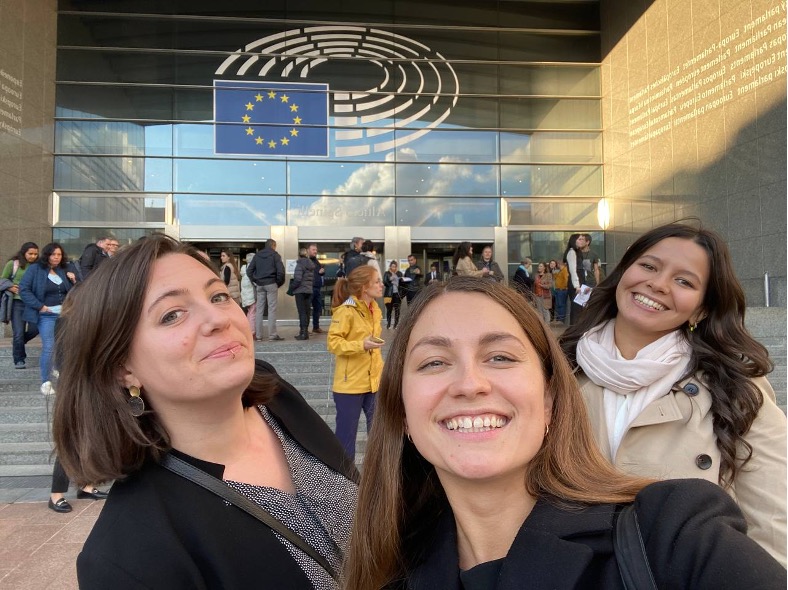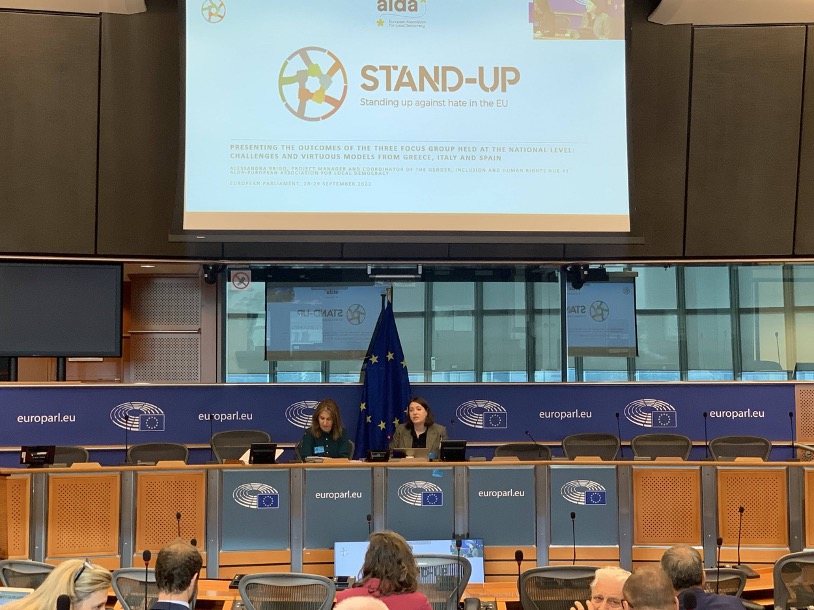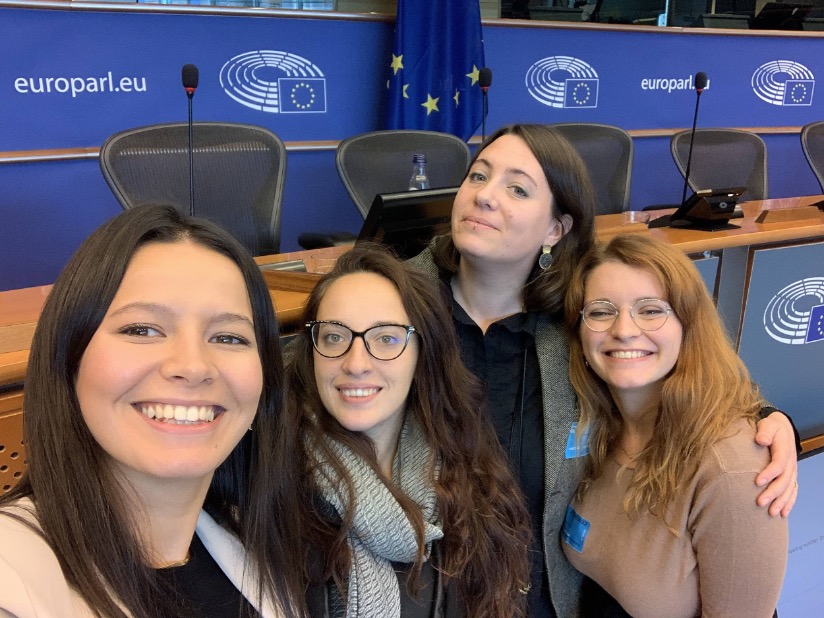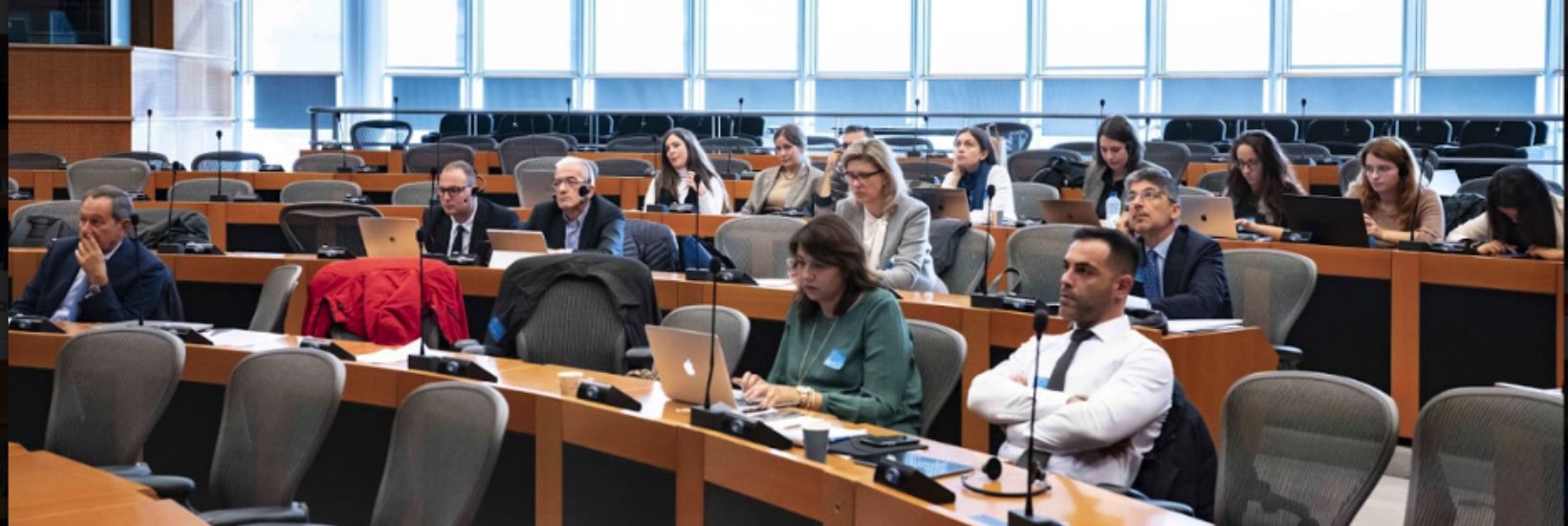On 28 and 29 September 2022, ALDA team was part of the event on combating hate crime and hate speech at the European Parliament.
The event took place in the framework of STAND-UP project that aims at countering and standing-up against hate in the EU; its goal is to create a comprehensive counter-hate crime framework covering all components of the counter-hate process, reporting-investigating-prosecution-prevention (RIPP), embedded within a framework of victim support. The project targets France, Greece, Italy, and Spain.
‘Defining Hate Crime: Towards a Common European Definition’ is already the second project event hosted by the Public Prosecutor’s Office at the Ordinary Court of Trento (leader). Previously, the consortium met in Granada for the kick-off held by Fundacion Euroárabe de altos estudios (FUNDEA).
The two-day event in Brussels began with the panel discussion by the experts representing multiple national and international agencies involved in the development and implementation of policy regulations on hate speech and crime – CoE, DG Justice, OSCE and others.
Giovanni Gasparini, deputy Public Prosecutor of Venice (VEJudPol), opened the session with a general overview of the STAND-UP project and its objectives. He defined the concept of ‘hate crime’ as a criminal offence committed with a bias motive as a distinctive element’, and introduced the challenges related to prosecuting it. Followed by Viktoer Kundrak, Hate Crime Officer at OSCE, summarised the OSCE way of legislating against hate crime.
Menno Ettema, Programme manager & Co-Secretary to the former Committee of Experts on Combating Hate Speech at the Council of Europe, spoke about the Recommendation on combating hate speech, which is the main legal and policy framework reference to prevent and combat this situation . Mr Ettema, however, stressed on the non-binding nature of the Recommendation, which results in its arbitrary application by the member states.
Opening the second panel, Viviana Gullo, Junior Project Manager at AGENFOR, presented the case of Austrian doctor Lisa-Maria Kellermeyer, a victim of hate speech and cyber bulling by the anti-vaxxers. For months, she reported attacks on social media and threatening letters from people writing they wanted to “slaughter” her and her staff, which was neither acknowledged as a crime nor properly investigated by law enforcement. The case ended with the doctor committing suicide, prompting more attention to the legal regulation of hate speech. This example served to prove how the STAND-UP blueprint would define a model to tackle hate phenomena and prevent them.
In his discourse about standing up in education, Alberto Izquierdo Montero, from UNED MADRID, talked about visualise the mechanisms of hate speech to critically read the world. He focused on the importance of education in addressing hate speech, presenting a participatory research on adolescents facing this issue, to identify scenarios, agents and coping strategies.
The last session focused on the civil society role in tackling hate crimes was opened by Professor Vasiliki Artinopoulou, European Public Law Organisation (EPLO) and Member of SPT UN. Prof. Artinopoulou highlighted the importance of coordinated responses to tackle these phenomena, in particular the added value of having a joint system between the justice system and the CSOs to share information and collaborate. “We live in an era of conflicts, austerity, recession and insecurity, and thus there are only a few non-negotiable values, such as human dignity, respect and justice, remarked the Professor.
The importance of education in addressing hate speech
During the second day, Alessandra Brigo, Project Manager and Coordinator of ALDA’s Gender, Inclusion and Human rights HUB, presented the findings of the focus groups held between May and July 2022 in Italy, Spain, and Greece. One of the most striking research results revealed the bias in law enforcement and the police departments on what concerns racism, victim blaming and others. ALDA colleague suggested that the STAND-UP project presents a unique opportunity to tackle these bias, and urged to pay particular attention to it, to make a real impact on the systems in the targeted countries.
In the discussion about the best practices to counter hate speech/crime, Giovanni Gasparini pointed out that the existing national legislation in Italy is poor, less effective and non inclusive and that the legal provisions are not in line with the cultural evolution of society.
Garyfallia Anastasopolou, Lucía García del Moral, and Sergio Bianchi, discussed in a round table on coordinated responses to tackle hate crimes and the role of Civil Society Organisations.
A contribution about the technology to prevent hate speech was made by Luigi Ranzato and Nicola Cordeschi from the judicial police of the Public Prosecutor’s Office of Trento.
Cristina Rodríguez Reche from the universitat Autònoma de Barcelona, talked about the importance of a gender and intersectional perspective in the context of Islamophobia in Europe.
Concluding the session Carmelo Ruberto, former Public Prosecutor’s Office of Rovigo, talked about the Sinti ethnic group in the hate context, presenting a real case of the murder of C.E, and ethnic Sinti, by his minor son and his moral accomplice. The case was relevant because the accomplice showed a strong racist attitude, but this aggravating circumstance was not taken into consideration.
The event was a good opportunity to discuss this phenomena, in order to see what has been done and what needs to be tackled in the next phase of the project.



